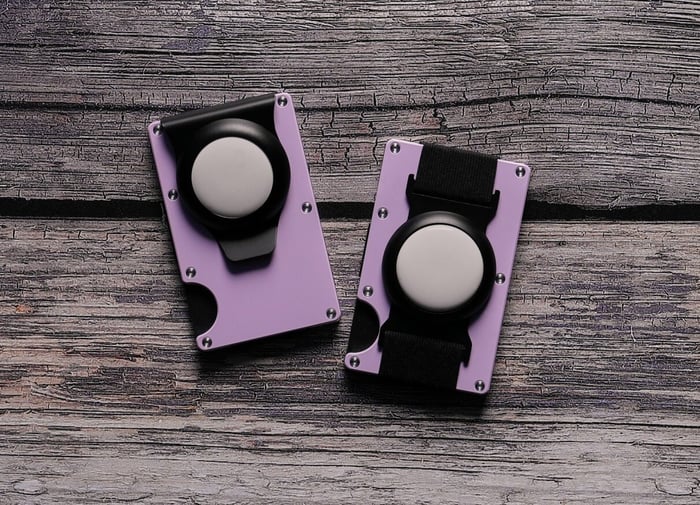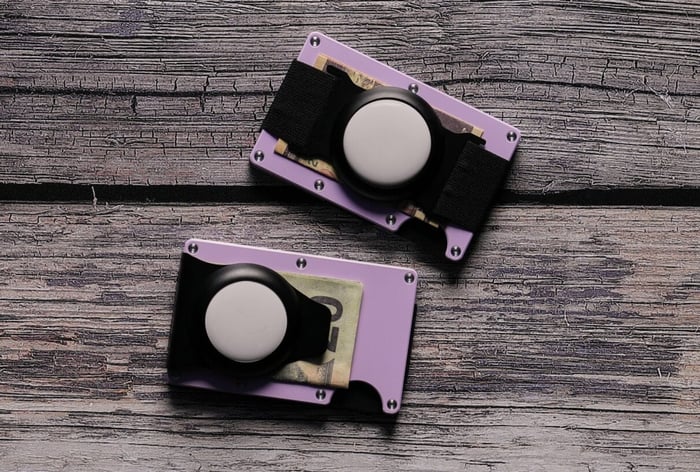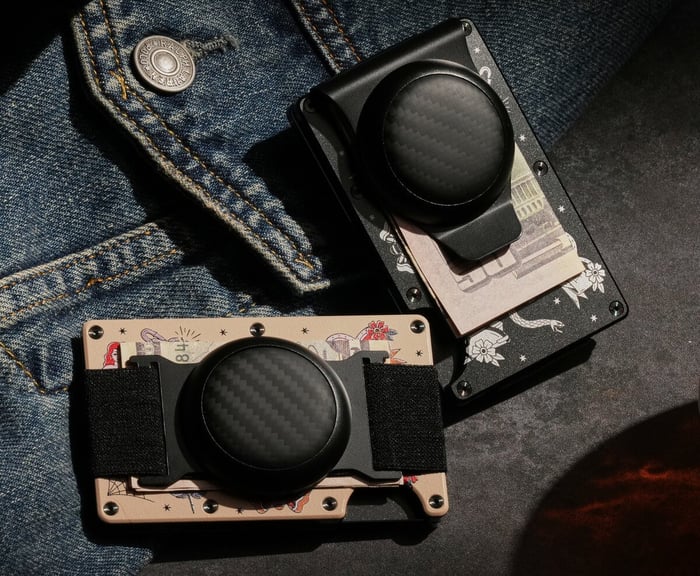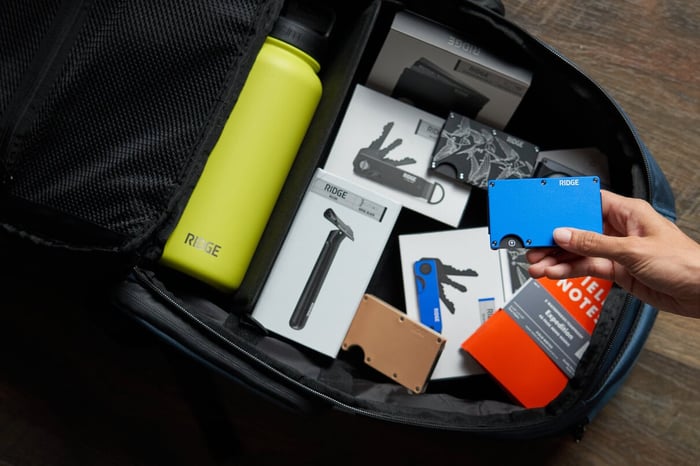Your wallet is a central hub for so much of your personal information. It’s where you keep credit cards, business cards, and personal ID. You may even use your wallet to store your Social Security or insurance card.
So, what happens if you lose it?
Losing a wallet is a frustrating experience. It’s also a common one, with 62% of people stating they’ve lost a wallet at some point according to a MoneyTips survey. Sadly, there isn’t always much you can do to get your hands back on your wallet. But there are things you can do to protect yourself and prevent identity fraud.
We’ve prepared 17 tips that help you deal with a missing wallet. Whether you want more protection or have just lost your wallet, don’t fret and read through for a solution.
Prevent Yourself from Losing Your Wallet
An ounce of protection is worth a pound of cure. What does that mean when you’re dealing with a lost wallet? Taking steps to prevent the loss of your wallet is as important as doing the things you need to do to find it.
Use a Tracker
If you’re willing to invest a little money, a wallet tracker is an excellent preventative device you can use to find your lost wallet. These devices slot into your wallet and connect to a smart device, such as a smartphone. They’ll alert you to the location of your wallet, as long as the device isn’t removed.
Trackers are built to be durable and offer a lengthy lifespan. However, you may find that they’re inconvenient, especially if your wallet already has a slimline design. If your wallet has fallen into the wrong hands, you may also find that a savvy thief will remove the tracker. Still, trackers can help you find wallets that you’ve misplaced.

Routinely Put Your Wallet in the Same Front Pocket
Why is a front pocket wallet effective when it comes to preventing the loss of a wallet?
Think about it like this.
A wallet stored in a loose trouser pocket can easily slip out or provide an attractive target to thieves. But a wallet stored in your front pocket is more noticeable, meaning you can glance down and see it, in addition to being easier to feel. Even slim front pocket wallets, like those offered by Ridge, are easier to keep track of than larger wallets placed in trouser pockets.
Decide What is Necessary
The items you store in your wallet can make turn you into a victim of identity theft before you even know it.
So, ask yourself the question:
Do I need to carry everything that I have in my wallet?
For example, you could memorize your Social Security number instead of keeping a Social Security card in your wallet. You certainly don’t need documents that clearly identify who you are, such as your birth certificate. Instead, only carry what is necessary for the day ahead, such as a credit card, work ID, driver’s license, and health insurance card.
Use 2FA
What are the immediate steps to follow after losing a wallet? You’ll likely file a lost wallet police report and take steps to get a new credit card. But thieves can still use the card numbers to make fraudulent charges while you’re waiting.
Prevent that from happening with two-factor authentication (2FA).
2FA or multi-factor authentication requires the user to go through two forms of identification checking before they can access sensitive material. For example, an online banking website may ask for a password and then send a unique security code to your mobile device before providing access. There are also mobile apps available, such as Authy, that allow you to set up 2FA on your private accounts. Use this technology to ensure that a thief can’t use a stolen wallet to access private or financial details.
Best Ways to Track Down Your Wallet
So, you’ve protected your wallet as best you can. But you still want to try and find it. These quick steps show you how to find a lost wallet if you’re certain you lost it during the day.
Retrace Your Steps
Where have you been and what have you done during the day? Answer those questions to create a mental map of every location you’ve visited. Then, go to those places. Retrace your steps and examine any location you spent an extended amount of time in. Ask around to see if anybody has handed a wallet in. For example, if you visited a restaurant, you could ask the servers if they have a lost and found box that may contain your wallet.
Contact Places You've Been
Don’t have the time to head back to every place you’ve been to since you lost your wallet?
Pick up the phone instead.
Call any bars, restaurants, workplaces, and any other venue that has a phone number that you’ve visited. You might get lucky and discover somebody handed your wallet in.

What to Do When You Know You've Lost Your Wallet
You can’t track your wallet and you’ve visited or called every place that you think it could be.
And you haven’t found it.
At this point, you have to accept that your card wallet is gone and there’s probably no way to get it back. Now, it's time to go into damage limitation mode. Do all of the following to protect yourself and ensure you don’t become a victim of identity fraud.
Take Some Deep Breaths
It’s natural to panic when you lose your wallet. That wallet contains so many things that are vital to your life. Your mind might start jumping to the worst-case scenarios and they really don’t bear thinking about.
Stop for a moment and take some deep breaths.
You can’t think straight when you’re panicking. Relax for a few moments and then get to work.
Freeze Your Credit Cards And Debit Cards
Get in touch with your bank to let them know about the situation. If you’re certain that your wallet wasn’t stolen, ask your bank to freeze your credit and debit cards. This places a temporary block on their use, meaning anybody who finds the wallet can’t make fraudulent charges. If you retrieve your wallet, you can unfreeze the cards and use them again.
Cancel Your Credit Cards if You Think They're Stolen
If you feel your wallet may have been stolen, freezing the card may not be enough. Freezing doesn’t offer identity theft protection against experts who can find ways to unfreeze your cards.
Instead, ask your card issuer to cancel your cards.
This permanently deactivates your old cards and causes your issuer to supply new cards to you.
Setup Fraud Alerts with Credit Bureaus
Credit bureaus track your spending and issue credit scores. These scores often play a key role in determining whether you can access loans, such as car finance or a mortgage. If a thief has your credit cards, they may max them out and put you in a position where you can’t repay the debt. Failure to repay your debts leads to black marks on your credit reports, which affect your score.
You can get ahead of this problem by contacting the three major credit agencies to set up fraud alerts. This lets the agencies know that your cards may be stolen, which makes it easier to rectify issues with them later on. Here are the contact details for three major credit agencies:
Equifax: 1-800-525-6285
Experian: 1-888-397-3742
TransUnion: 1-800-680-7289
Call the Local DMV
You’ll need to get a new driver’s license if your wallet is stolen. Otherwise, an identity thief could use your old license because it’s still valid.
Contact the Department of Motor Vehicles (DMV) and inform them of the situation. Request a new driver’s license so you have access to this vital form of ID.
Contact Your Insurance Company
You may have been carrying a health insurance card for a dentist or hospital. Again, thieves can use those cards to commit fraud if you don’t cancel them. Contact your insurers, cancel the cards, and request new ones.
Change Your Passwords
Any item in your wallet that’s linked to an online account presents a danger. For example, debit cards provide most of the details a hacker may need to access your bank account. If they have your password too, you’re in serious trouble. Change your online bank account password and set up 2FA if you haven’t done so already.
If You Lost Your Social Security Card, Replace It
It’s generally not a good idea to carry your Social Security card because identity thieves can use the information the card contains. But if your wallet contained your card, you can get a replacement by contacting Social Security at 1-800-772-1213 or visiting the Social Security page online.
File a Police Report
File a police report with the local authorities to alert them to the possibility of your wallet being stolen. The police may be able to track locations where your credit cards were used, which could provide them with leads on the thief.
You’ll receive a police report number you can site when discussing your case with the authorities.
Make a Replacement List
Grab a pen and paper and list every item you can remember being inside your wallet. You now have a checklist of things you need to replace. Check each item off the list as you arrange a replacement for it, in addition to keeping notes related to freezes or cancellations.
Update Your Auto-Pay Accounts
You may have auto-pay set up on several accounts that use your credit or debit card details. That’s a problem if you’ve had to cancel or freeze your cards. Update any auto-pay accounts to manual payment or insert the details of new cards, if you have them. Otherwise, these accounts won’t be able to collect their money, which could register on your credit report as a missed payment.
Lost Wallet FAQs
Do I Call 911 if I Lost My Wallet?
Don’t call 911 if you have lost your wallet because a lost wallet is not considered an emergency. Instead, contact your local police department to file a lost wallet police report.
How do you call someone who lost their wallet?
Search the wallet for any identifying information, such as an address or business phone number. Contact them directly if you find the appropriate details. If you can’t find a personal number, contact their bank or credit card company and ask them to contact the person who lost the wallet.
What should I do if I find a lost wallet?
Start by trying to find contact details in the wallet so you can call the person directly. If details aren’t available, return the wallet to the nearest police station. You may also hand it into a place of business’s lost and found box, assuming the wallet was found in that place of business.
What if I lost my wallet in a public place?
Retrace your steps to see if you happen upon the wallet. If you don’t find it, file a police report.
Conclusion
Finding a lost wallet isn’t always an impossible task. Sometimes, retracing your steps and getting in touch with any companies you visited during the day will lead you to the wallet. Having a wallet tracker is also useful, especially if you dropped the wallet and it stays stationary.

Evan Grimm, Writer
Evan Grimm is a practical writer, blogger, editor, and knowledgeable up-and-coming authority in the outdoor realm. His best-known content is published on Bowhunting.com, The Alaska Frontier, and Exodus Outdoor Gear. He and his family reside in central Alaska, where daily common sense and practicality are necessary. His commercial pilot and aircraft technician certifications make him focus on what is relevant and solidly provable. You will find him writing or proving more content.











































